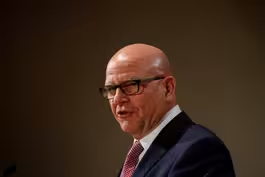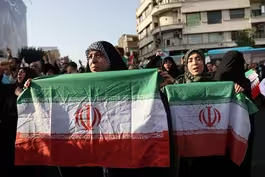
Desperation mounts as Gazans are killed while seeking aid
Clip: 6/22/2025 | 4m 45sVideo has Closed Captions
Desperation mounts in Gaza as Palestinians are killed while seeking food aid
While the world’s attention is focused on Iran, Israel’s war in Gaza continues. Gaza health officials said Israeli strikes over the past 24 hours killed 51 Palestinians and wounded 104. John Yang speaks with James Elder, global spokesperson for UNICEF, about the humanitarian crisis in Gaza.
Problems playing video? | Closed Captioning Feedback
Problems playing video? | Closed Captioning Feedback
Major corporate funding for the PBS News Hour is provided by BDO, BNSF, Consumer Cellular, American Cruise Lines, and Raymond James. Funding for the PBS NewsHour Weekend is provided by...

Desperation mounts as Gazans are killed while seeking aid
Clip: 6/22/2025 | 4m 45sVideo has Closed Captions
While the world’s attention is focused on Iran, Israel’s war in Gaza continues. Gaza health officials said Israeli strikes over the past 24 hours killed 51 Palestinians and wounded 104. John Yang speaks with James Elder, global spokesperson for UNICEF, about the humanitarian crisis in Gaza.
Problems playing video? | Closed Captioning Feedback
How to Watch PBS News Hour
PBS News Hour is available to stream on pbs.org and the free PBS App, available on iPhone, Apple TV, Android TV, Android smartphones, Amazon Fire TV, Amazon Fire Tablet, Roku, Samsung Smart TV, and Vizio.
Providing Support for PBS.org
Learn Moreabout PBS online sponsorshipJOHN YANG: While the world's attention is focused on Iran, Israel's war in Gaza continues.
Gaza health officials say Israeli strikes over the past 24 hours killed 51 Palestinians and wounded 104.
In addition, Israel says it recovered the bodies of three hostages Hamas captured in the October 7 attacks.
And as the fighting goes on, so does the humanitarian crisis.
James Elder is global spokesman for UNICEF.
James Elder, I know you're just back from having spent a little more than a week in Gaza.
I'm curious, how did conditions compare with previous visits?
JAMES ELDER, UNICEF Global Spokesman: John, somehow the situation for Palestinians in Gaza has never been worse, just this relentless bombardment.
So people have been pushed to the very brink.
On top of that, the only way that water can be produced, distributed, treated is through fuel.
There's been a hundred day blockade of any fuel whatsoever coming into Gaza.
Within two weeks, two weeks we're going to see a complete lack of any drinking water.
They cannot live without water.
So that struck me heavily.
Malnutrition rates 100 children a day over the course of 2025.
And I think, John, the level of children I've seen with wounds of war over five visits is unparalleled to anything I've seen in my two decades of this work.
I don't just see those injuries now, you hear them.
Every hospital is the sound of children screaming because of a severe lack of painkillers.
JOHN YANG: Any one of those children stand out in your memory?
JAMES ELDER: All of them, Maybe two.
Particularly one little boy who I met on the very first day.
He sticks out, John, because he'd been given money to go and get bred by his father.
He saw people moving to one of these new aid distribution points in the south, the limited ones, the militarized ones, and he thought this was his moment to bring back a box of food.
Chaos ensured, quadcopters shooting.
He was struck by tank shrapnel in his stomach.
This boy Connected with me because his family wanted a video because they were desperately trying to get him the health care he needed medical evacuation.
He sat up through the pain to speak.
On my final day there, he succumbed to those injuries and he died.
He died trying to get food for his family who are starving.
JOHN YANG: This is happening.
More and more people being shot, wounded, killed while trying to get aid, especially at sites being run by the Gaza Humanitarian foundation, which is backed by the Israelis in the US.
Why is this happening and what can be done to prevent it?
JAMES ELDER: The only thing that can be done to prevent it is to return to what the world has known in crisis zones and war zones since World War II.
It's humanitarian aid.
Humanitarian aid is based on some simple principles, but they are work out what the needs are and go to where people are.
These points are militarized.
There's a handful of them, three or four.
Only.
Only the strongest people get anything there.
So this setup, as it stands, is making things much more desperate for civilians.
Not only because we've seen so many mass casualty events, but because it's trying to replace a tried and tested humanitarian system that, as I say, has worked since World War II.
And most significantly, two months ago, during a ceasefire, hostages go home.
Aid goes across the Gaza Strip.
JOHN YANG: We've got a little bit of sound I want to play for you.
It's a Palestinian mother whose son was injured while trying to get aid.
UMM FIDA MASOUD (through translator): Do we send our children to death?
No, we don't send them to their death.
We send them to bring us food so that we do not die.
No one is seeing us.
The whole world is focused on Iran and left us.
We have been suffering since October 7th.
JOHN YANG: Is that a concern for you that all this attention, a lot of attention, is shifting to the fighting between Israel and Iran?
JAMES ELDER: Yeah.
Hearing her words, John, it reminds me of a fourth year English literature student I sat with in Gaza a week ago who said, James, starvation is just so humiliating to have to go to a hospice every night with a bowl and crowds of people and hope you get some sort of food.
Let's be very clear on that.
That is what's happening here.
Parents losing their children while they simply go to get food for their family.
Yes, to your larger question, without a doubt it's a concern.
Gaza has never been in a more perilous moment.
There's a very real fear that it's being overshadowed.
And Gazans, as they've said to me, international humanitarian law doesn't apply to us.
That's a terrifying, terrifying realization for a population that rightly, very rightly feels absolutely abandoned.
JOHN YANG: James Elder of UNICEF on the very grim situation in Gaza.
Thank you very much.
JAMES ELDER: Thank you, John.
Former national security adviser analyzes U.S.-Iran strikes
Video has Closed Captions
Clip: 6/22/2025 | 6m 8s | Former national security adviser analyzes U.S. airstrikes on Iran (6m 8s)
How Iran could respond to U.S. strikes on its nuclear sites
Video has Closed Captions
Clip: 6/22/2025 | 4m 52s | How Iran could respond to U.S. strikes on its nuclear sites (4m 52s)
A look inside the U.S.’ unprecedented direct attack on Iran
Video has Closed Captions
Clip: 6/22/2025 | 4m 52s | What we know about the U.S.’ unprecedented direct attack on Iran (4m 52s)
News Wrap: Gunman killed after shooting into Michigan church
Video has Closed Captions
Clip: 6/22/2025 | 2m 29s | News Wrap: Gunman killed after shooting into Michigan church (2m 29s)
Providing Support for PBS.org
Learn Moreabout PBS online sponsorshipSupport for PBS provided by:
Major corporate funding for the PBS News Hour is provided by BDO, BNSF, Consumer Cellular, American Cruise Lines, and Raymond James. Funding for the PBS NewsHour Weekend is provided by...















